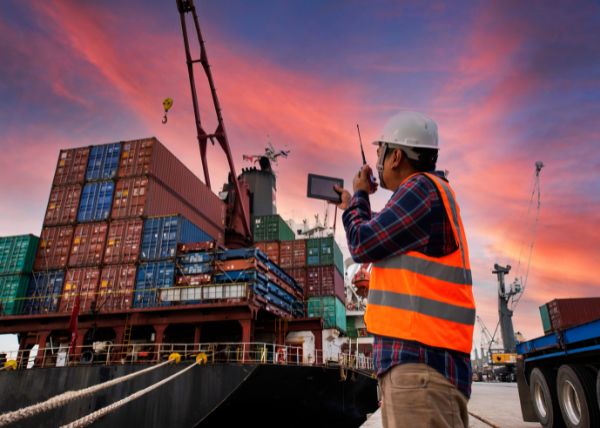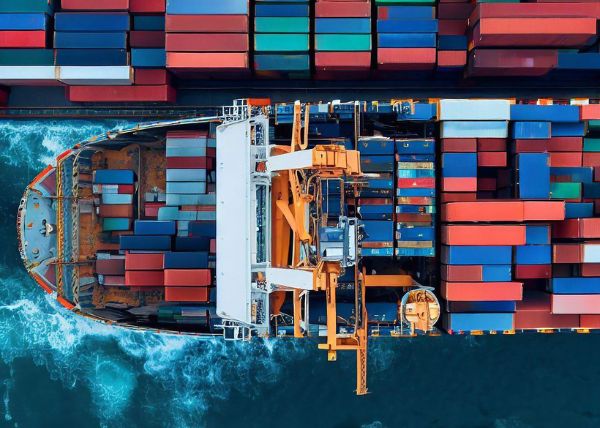Maritime Injury Lawyer in New York

Workers in the maritime industry are typically familiar with the risks and dangers that come with a job at sea. Injuries at sea can be devastating, both physically and financially. When accidents strike, knowing your rights to workers’ compensation is crucial to getting you the compensation you deserve. Employing a maritime injury lawyer will help you navigate the legal process, potentially saving you time and money in the long run. At Katz, Leidman, Freund & Herman, we specialize in workers’ compensation cases, including for those working in the maritime industry.
Who Is a Maritime Industry Worker?
Maritime industry workers are individuals employed in various occupations related to maritime activities, including shipping, navigation, fishing, offshore drilling, and other maritime operations. These workers play crucial roles in the transportation of goods and passengers, exploration and extraction of natural resources, maintenance of maritime infrastructure, and other maritime-related activities.
You may be a maritime industry worker if the following is your title:
Merchant Mariners
These are individuals who work aboard commercial vessels such as cargo ships, tankers, container ships, and passenger vessels. Merchant mariners may serve as captains, mates, engineers, deckhands, and other crew members responsible for operating and maintaining vessels.
Dockworkers and Longshoremen
Dockworkers and longshoremen are responsible for loading and unloading cargo at ports and terminals. They operate machinery such as cranes, forklifts, and cargo-handling equipment to transfer goods between vessels and land-based transportation.
Offshore Oil and Gas Workers
Offshore oil and gas workers are employed on offshore drilling platforms, oil rigs, and production facilities located in coastal waters and the open sea. These workers include engineers, rig operators, technicians, divers, and support personnel involved in drilling operations, maintenance, and production activities.
Fishermen and Commercial Fishers
Fishermen and commercial fishers engage in fishing activities, including harvesting fish, shellfish, and other marine organisms for commercial sale. They operate fishing vessels, deploy fishing gear such as nets and traps, and process and store catch for distribution.
Shipyard Workers
Shipyard workers are employed in shipbuilding, repair, and maintenance facilities where vessels are constructed, repaired, and refurbished. These workers include welders, pipefitters, electricians, painters, carpenters, and other skilled tradespeople involved in shipyard operations.
Tugboat and Towboat Crews
Tugboat and towboat crews operate small, powerful vessels known as tugboats and towboats to assist larger vessels in navigating harbors, rivers, and waterways. They provide towing, pushing, and maneuvering services to assist ships in docking, undocking, and navigating through narrow channels.
Ferry and Water Taxi Operators
Ferry and water taxi operators provide passenger transportation services between various waterfront locations, including urban centers, islands, and coastal communities. They operate ferry boats, water taxis, and other passenger vessels to transport commuters, tourists, and travelers across bodies of water.
Maritime industry workers are subject to unique risks and hazards associated with working on or near water, including vessel accidents, falls overboard, collisions, equipment malfunctions, adverse weather conditions, and exposure to hazardous materials. As such, they may be entitled to specific legal protections and remedies under maritime law and workers’ compensation laws in the event of workplace injuries or accidents.
Maritime Accidents and Compensation

Maritime accidents can result in serious injuries, fatalities, and significant property damage due to the inherent risks and hazards associated with working on or near water. When maritime workers suffer injuries or losses as a result of these accidents, they may be entitled to compensation for their damages.
Types of Compensation for Maritime Accidents
- Maintenance and Cure: Maritime workers who sustain injuries or illnesses while in the service of a vessel are entitled to maintenance and cure benefits under general maritime law. Maintenance refers to daily living expenses, including food and lodging, while the worker is recovering from the injury or illness. Cure covers the reasonable and necessary medical expenses associated with treating the injury or illness.
- Jones Act Claims: The Jones Act, also known as the Merchant Marine Act of 1920, provides a remedy for maritime workers who are injured or killed due to the negligence of their employers or fellow crew members. Under the Jones Act, eligible maritime workers can pursue compensation for medical expenses, lost wages, pain and suffering, and other damages resulting from the accident.
- Unseaworthiness Claims: Maritime workers may also have a claim for unseaworthiness if the vessel on which they were working was not reasonably fit for its intended purpose at the time of the accident. Unseaworthiness claims allow injured workers to seek compensation for injuries caused by unsafe conditions onboard the vessel, regardless of fault.
- Longshore and Harbor Workers’ Compensation Act (LHWCA): The LHWCA provides benefits to maritime workers who are not covered by state workers’ compensation laws, such as longshoremen, harbor workers, and certain other maritime employees. Eligible workers can receive compensation for medical treatment, disability benefits, vocational rehabilitation, and survivor benefits for dependents in the event of a worker’s death.
- Death on the High Seas Act (DOHSA): DOHSA allows certain family members of maritime workers who are killed in international waters due to negligence or unseaworthiness to pursue wrongful death claims against responsible parties. Damages under DOHSA may include compensation for financial losses, loss of support and services, funeral expenses, and other related costs.
Injured maritime workers should seek immediate medical attention and report the accident to their employer or vessel owner as soon as possible. It is essential to document the details of the accident, gather evidence, and consult with an experienced maritime injury attorney to understand their rights and explore their options for pursuing compensation. A knowledgeable attorney can provide guidance and advocacy throughout the claims process to help injured maritime workers recover the compensation they deserve.
How a New York City Maritime Injury Lawyer Can Help
With New York City as a coastal city, maritime workers in the area are at risk of suffering injuries while working on vessels or at ports. In the event of a maritime injury, it is crucial for injured workers to seek legal representation from a knowledgeable and experienced maritime injury lawyer in New York City. Katz, Leidman, Freund & Herman fight for New York workers who have been injured in maritime accidents, helping them navigate the complex legal process and obtain the compensation they deserve. Here’s what you can expect when you choose our firm:
- Legal Expertise: Our partners are well-informed about New York workers’ compensation laws, including maritime law. This includes the Jones Act, the Longshore and Harbor Workers’ Compensation Act (LHWCA), and other applicable laws and regulations. We can assess the specifics of your case, determine liability, and advise you on the best course of action to pursue compensation.
- Meticulous Evidence Gathering: Our lawyers will conduct a thorough investigation into the circumstances surrounding your accident to gather evidence and build a strong case on your behalf. This may include obtaining witness statements, reviewing accident reports, analyzing medical records, and consulting with experts to assess the extent of your injuries and damages.
- Maximizing Compensation: We are dedicated to achieving maximum compensation for our clients. This means pursuing all forms of available compensation, such as medical expenses, lost wages, pain and suffering, disability benefits, vocational rehabilitation, and wrongful death damages for surviving family members.
- Dedicated Support and Advocacy: At Katz, Leidman, Freund & Herman, we understand that dealing with a maritime injury can be overwhelming, especially when you’re facing physical, emotional, and financial challenges. Our maritime lawyers will provide you with the support and advocacy you need during this difficult time, advocating for your rights and fighting tirelessly to achieve the best possible outcome for your case.
Don’t let a maritime injury derail your life. Contact Katz, Leidman, Freund & Herman today to schedule a free consultation with a skilled maritime attorney in New York City. We are committed to helping injured workers seek justice and recover the compensation they deserve. Let us handle the legal complexities of your maritime injury claim so you can focus on recovering and moving forward with your life.
Katz, Leidman, Freund & Herman Prioritize New York Workers
If you’ve been injured in a maritime incident, let our maritime lawyers work for you to obtain the compensation that you deserve. We offer free consultations, fill out our online form or call us at 646-439-3003 to get started today.
New York Maritime Injury Lawyer FAQs
What types of maritime accidents are covered by maritime injury law?
Maritime injury law covers a wide range of accidents that occur on navigable waters, including ship collisions, slip and falls on vessels or docks, crane accidents, falls overboard, and injuries caused by defective equipment or unsafe working conditions.
What laws protect maritime workers who are injured on the job?
Maritime workers are protected by various federal laws, including the Jones Act, the Longshore and Harbor Workers’ Compensation Act (LHWCA), and general maritime law. These laws provide different avenues for injured workers to seek compensation for their injuries and losses.
How soon should I contact a maritime injury lawyer after an accident?
It’s crucial to contact a maritime injury lawyer as soon as possible after an accident to ensure that your rights are protected and that valuable evidence is preserved. Delaying contacting a lawyer could potentially harm your case and limit your ability to recover compensation.
What compensation am I entitled to as an injured maritime worker?
Injured maritime workers may be entitled to compensation for medical expenses, lost wages, pain and suffering, disability benefits, vocational rehabilitation, and other damages resulting from their injuries. The specific types of compensation available will depend on the circumstances of the accident and the applicable laws.
What if I’m injured while working on a vessel outside of U.S. territorial waters?
Maritime workers injured while working on vessels outside of U.S. territorial waters may still be entitled to compensation under U.S. maritime law, including the Jones Act and general maritime law. An experienced maritime injury lawyer can help you navigate the complexities of these cases.
Can I file a lawsuit against my employer for a maritime injury?
In most cases, maritime workers cannot sue their employers directly for workplace injuries due to the legal principle of “maintenance and cure.” However, they may be able to pursue compensation through other avenues, such as filing a claim under the Jones Act or LHWCA.
What if I signed a waiver or release of liability before the accident?
Waivers or releases of liability may not always prevent injured maritime workers from seeking compensation for their injuries, especially if the waiver was obtained through fraud, coercion, or if it violates maritime law. An experienced maritime injury lawyer can review the circumstances surrounding the waiver and advise you on your legal options.
How long do I have to file a maritime injury claim?
The statute of limitations for filing a maritime injury claim can vary depending on the specific circumstances of the case and the applicable laws. The statute of limitations in New York is typically 3 years. It’s important to consult with a maritime injury lawyer from Katz, Leidman, Freund & Herman. We’ll help ensure you don’t miss any important deadlines.
